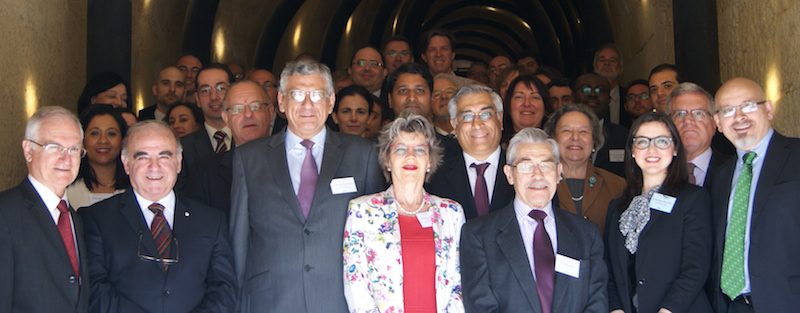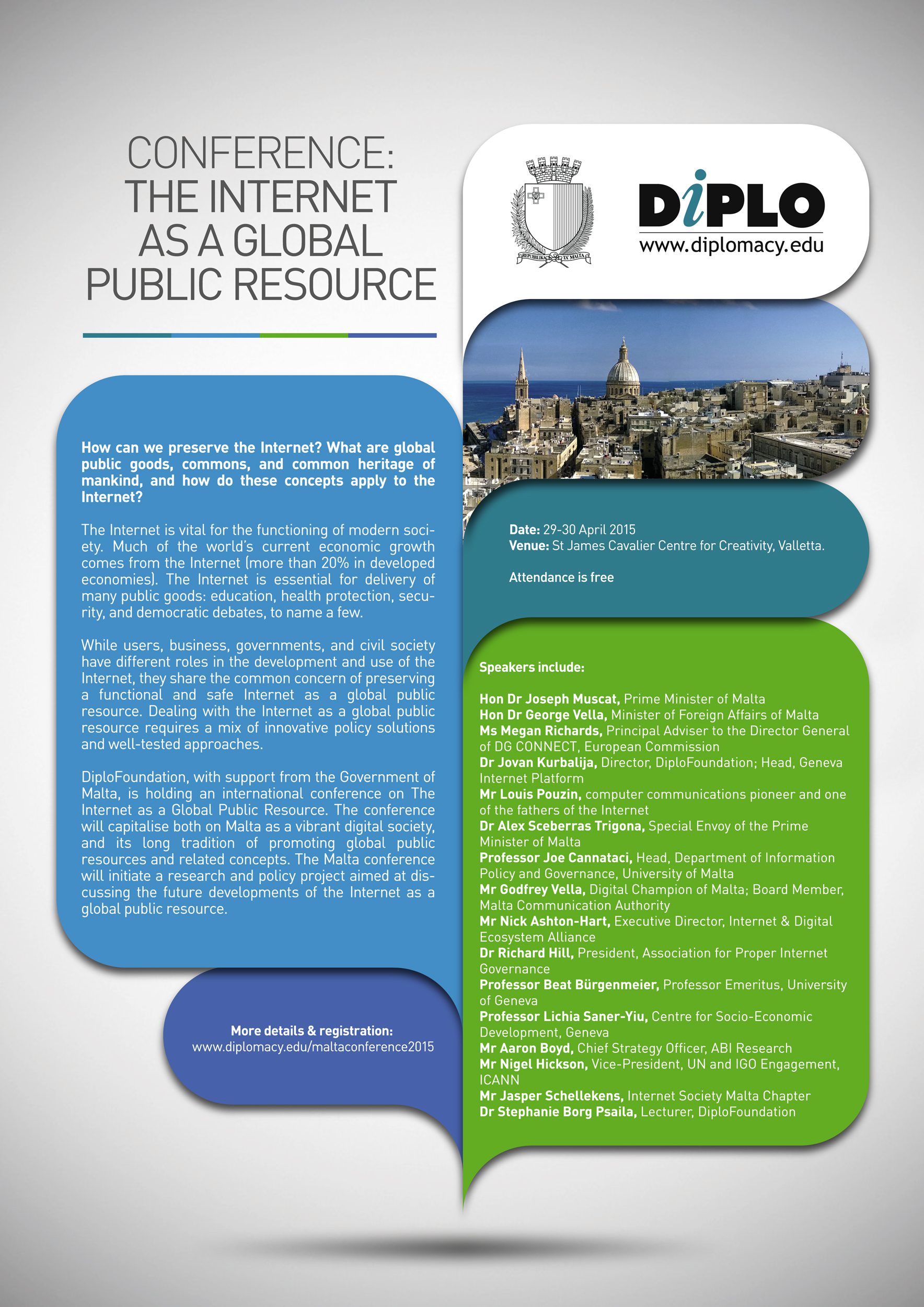Dealing with positive and negative externalities of the Internet as a global public resource
Updated on 05 April 2024
[Update] Read the reports which summarise the panel discussions:
- Panel 1: The Internet ‘an exceptional global public resource’
- Panel 2: What aspects of the Internet can be considered global public resources?
- Panel 3: Dealing with positive and negative externalities
- Panel 4: Learning from other policy areas
- Panel 5: Facilitating an integrated approach to digital issues
- Concluding panel: From conference discussions to research project
[Update] Taking the project forward: Read the concept note on the Policy Research and Dialogue Project, published on 4 May
[Update] High-level speech by Minister for Social Dialogue, Consumer Affairs and Civil Liberties Dr Helena Dalli
[Update] View the conference photo gallery, and download the conference poster
[Update] Follow live tweets: #internetgpr
[Update] The conference in the media:
- Read the article and watch the interview with Louis Pouzin, in Nobody thought of making Web secure, on The Times of Malta (read the article in pdf format);
- Read: Muscat aims to position Malta as digital hub for small states in MaltaToday;
- Watch: Diskussi l-isfidi etici u teknologici ta’ l-internet’ (Ethical and technological challenges of the Internet in discussion), on TVM
- Press release: Internet conference, in The Times of Malta.
 Conference announcement
Conference announcement
While users, business, governments, and civil society have different roles in the development and use of the Internet, they share the common concern of preserving a functional and safe Internet as a global public resource. DiploFoundation, with support from the Government of Malta, is holding an international conference on The Internet as a Global Public Resource. The conference will take place in Malta, on 29-30 April 2015. The Malta conference will initiate a research and policy project aimed at discussing the future developments of the Internet as a global public resource.
The conference will take place on 29-30 April, at St James Cavalier Centre for Creativity, Valletta, Malta.
1. Context
The Internet is vital for the functioning of modern society. Much of the world’s current economic growth comes from the Internet (more than 20% in developed economies). The Internet is essential for delivery of many public goods: education, health protection, security, and democratic debates, to name a few.
While users, business, governments, and civil society have different roles in the development and use of the Internet, they share the common concern of preserving a functional and safe Internet as a global public resource.
Dealing with the Internet as a global public resource requires a mix of innovative policy solutions and well-tested approaches. The conference will capitalise both on Malta as a vibrant digital society, and its long tradition of promoting global public resources and related concepts (e.g. the common heritage of mankind).
2. Objectives
- Initiate the research and policy project on the Internet as global public resource
- Explore the technical, organisational, commercial, and societal aspects of the Internet that could be considered global public resources or related concepts (e.g. global commons, common heritage of mankind)
- Identify the roles of different actors (government, business, civil society) in both promoting and protecting global public resources
- Learn from the experience of global public resources in other policy areas (e.g. climate change, health, security) and ensure transversal cross-fertilisation
- Explore ways to link the Internet as a global public resource with the Post-2015 Sustainable Development Agenda
- Propose further research and policy dialogue on the Internet as a global public resource
3. Conference programme (draft)
(Last updated: 28 April 2015)
First Day (29 April 2015)
|
9:00‒9:30 |
Registrations Introductory statements by
|
| 10.30‒11:00 | Coffee break and group photo |
| 11:00–12.30 |
What aspects of the Internet can be considered global public resources?
|
| 12.30–14.00 | Lunch break |
| 14.00–15.30 |
How can we deal with the positive and negative externalities of the Internet as a global public resource? How can we ensure that privately owned Internet infrastructure (more than 90%) contributes to the Internet as global public resource?
|
| 15.30‒16.00 | Coffee break |
| 16.00–17.30 |
What can Internet policy learn from other policy areas where the concept of a global public resource has been used (e.g. climate change, health)?
|
Second Day (30 April 2015)
| 9.00–10.15 |
Digital policy operates in a cross-sectoral field; it cannot operate within niches. Many countries and international organisations face the challenge of addressing digital policy issues through a coordinated approach. In the next few years, Malta will play a highly important role in various global developments in which digital issues will feature prominently. The session will brainstorm ways and means on how Malta can facilitate an integrated approach to digital issues on both national and international levels.
|
| 10.15–10.45 | High level address by the Hon Dr Joseph Muscat, Prime Minister of Malta |
| 10.45–11:30 | Coffee break and networking |
| 11.30‒12.30 | Concluding session (summary and roadmap for future research) |
| 19:30‒21:00 (Please note change in time) |
Reception at San Anton Palace, hosted by H.E. The President of Malta Ms Marie-Louise Coleiro Preca
View the speakers’ bios. |
4. Venue and accessibility
The conference will take place on 29-30 April, at the St James Cavalier Centre for Creativity, Valletta, Malta.
For international delegates: view more details about the venue and how to reach it by public transport or taxi; a list of hotels within walking distance is also available.
5. Registration
To register for the event on 29-30 April, please fill in the registration form. Attendance is free of charge.
Online participation is not possible for this event.
Please note: Registrations for the reception at San Anton Palace are now closed.
6. Partners
- Government of Malta
- World Economic Forum
- DiploFoundation
- Other partners
For more infomation, contact Dr Stephanie Borg Psaila by e-mail or by calling +356 21333323 or +356 99496796.
Related blogs
Related events
Related resources
Subscribe to Diplo's Blog
The latest from Diplo and GIP
Tailor your subscription to your interests, from updates on the dynamic world of digital diplomacy to the latest trends in AI.
Subscribe to more Diplo and Geneva Internet Platform newsletters!
Diplo: Effective and inclusive diplomacy
Diplo is a non-profit foundation established by the governments of Malta and Switzerland. Diplo works to increase the role of small and developing states, and to improve global governance and international policy development.



